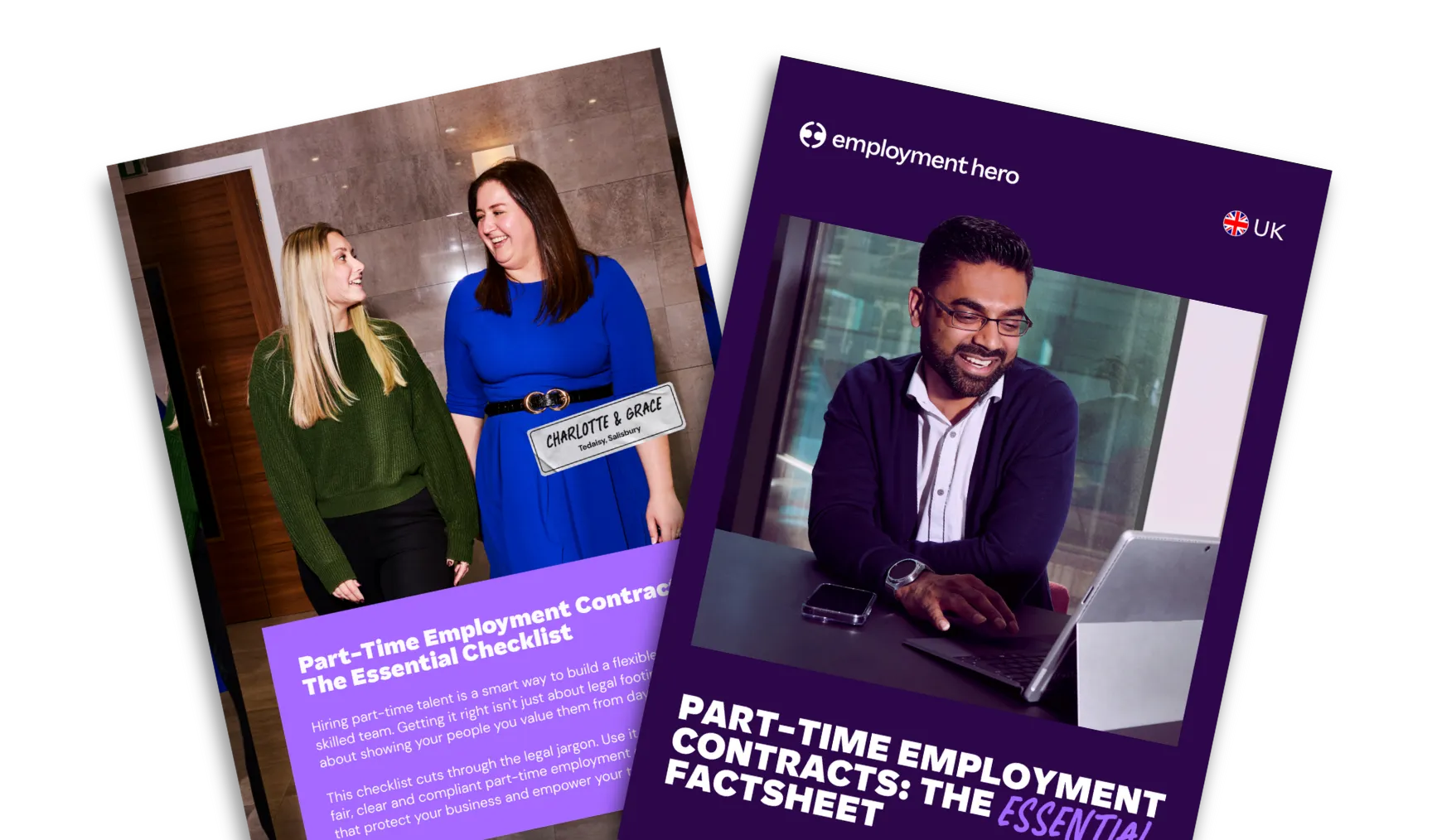Fixed term contracts: A guide for UK employers
Published
Fixed term contracts: A guide for UK employers
Published
In today’s fast-moving business landscape, flexibility is key. Many UK employers rely on fixed term contracts to fill short-term roles, manage seasonal demand or complete time-bound projects. These arrangements allow businesses to stay agile while providing workers with clarity and security for the duration of their employment.
However, fixed term contracts also come with specific legal obligations and employee rights under UK employment law and it’s essential that employers understand how to use them correctly. Misunderstanding the rules could lead to claims of unfair treatment or discrimination, as well as compliance risks under the Fixed term Employees (Prevention of Less Favourable Treatment) Regulations 2002.
What is in this guide?
- Overview of fixed term contracts
- Fixed term contract compliance checklist
- How to write a fixed term contract
- And more
What counts as a fixed term contract?
Under UK law, a fixed term contract is defined by the Fixed term Employees (Prevention of Less Favourable Treatment) Regulations 2002. These regulations protect temporary employees from being treated less favourably than comparable permanent employees.
In essence, it is an employment agreement that lasts for a specific period of time and ends when a particular task or event occurs. Once that date or event arrives, the contract automatically ends unless renewed.
The employee has a contract
An employee working in this capacity must have a formal employment agreement directly with the organisation they work for. This distinguishes them from agency workers, casual staff or zero-hour workers, who do not have the same employment relationship or rights.
For example, a graphic designer hired directly by your company to work on a rebranding project for six months would typically be a temporary employee, provided they have an employment agreement with your organisation.
The contract ends on a set date or upon completion of a task
Fixed term contracts often specify that employment will end on a set date or when a project or task concludes. Common examples include:
- Project-based work – such as hiring a software developer for the duration of a system implementation.
- Maternity or paternity cover – temporary cover for an employee taking extended leave.
- Seasonal hiring – bringing on extra staff during busy periods like summer or Christmas.
When can employers use a fixed-term contract?
Temporary arrangements like this are particularly useful when you need to address short-term business needs without committing to a permanent hire. Suitable circumstances include:
- Covering temporary absences, such as maternity, paternity or long-term sickness leave.
- Handling seasonal fluctuations, for instance in retail, hospitality or agriculture.
- Project or grant-based roles, especially in research, construction or education.
- Trialling new business ventures where long-term viability is uncertain.
- Specialist appointments for specific expertise not needed on an ongoing basis.
What doesn’t count as a fixed term contract?
Not every temporary arrangement qualifies as a fixed term contract. Misclassifying employees can expose your organisation to legal and financial risks.
The following roles are not considered fixed term employment under UK law:
Are employed by an agency instead of the company they work for
Agency workers are employed by the agency, not the end client. They are governed by separate legislation known as the Agency Workers Regulations 2010. This means they have different rights and protections.
Are a student or trainee on a work-experience placement
Students on short-term placements or unpaid internships generally do not hold employee status, so they’re not covered by the fixed term employee regulations.
Are working under a ‘contract of apprenticeship’
Apprenticeships follow specific rules under the Apprenticeships, Skills, Children and Learning Act 2009, meaning they are not categorised as fixed term contracts.
Are a member of the armed forces
Members of the armed forces are excluded from the Fixed term Employees Regulations altogether.
Key exceptions for eligibility
There are some grey areas where an individual may still qualify as a fixed term employee, even if their work appears temporary or flexible.
A seasonal or casual employee taken on for up to 6 months during a peak period
If a seasonal worker is employed on a clear start and end date with consistent hours and employment rights, they may legally hold fixed term employee status, entitling them to comparable treatment as permanent staff.
A specialist employee for a project
Hiring a short-term specialist, such as a consultant engineer or compliance officer , under an employment contract for a defined project can also meet the criteria for a fixed term contract.
Covering for maternity leave
Employees covering for maternity or parental leave are almost always employed on a fixed-term basis. Once the original employee returns, the contract ends naturally.
Can a fixed-term employee automatically convert to a permanent role?
Yes. Under UK employment law, an employee who has been continuously employed on successive fixed term contracts for four years or more will automatically become a permanent employee, unless the employer can show an “objective justification” for continuing the arrangement.
Objective justifications might include:
- A temporary funding stream (e.g. a grant due to expire).
- Project-specific employment where the role will genuinely end at completion.
- Covering for an employee on extended leave.
Employers should regularly review contract lengths and renewals to ensure they remain compliant and justified.
What employment status do fixed term employees have?
Employees on this type of agreement are employees, not workers or contractors. They are entitled to the same core employment rights as permanent staff, unless differences can be objectively justified.
This includes access to:
- Pension schemes.
- Training opportunities.
- Holiday pay.
- Sick pay.
- Maternity and paternity leave.
- Protection from unfair dismissal (after qualifying service).
- Redundancy rights.
In other words, apart from the contract duration, a fixed term employee should be treated no differently from a permanent one.
What are employee rights under a fixed term contract?
The Fixed term Employees Regulations 2002 guarantee that employees must not be treated less favourably than permanent employees performing similar roles. Key entitlements include:
- Equal pay and benefits – salary, bonuses and benefits must be comparable.
- Access to permanent roles – staff should be informed about internal vacancies.
- Statutory redundancy pay – if they meet the two-year qualifying period.
- Notice of termination – according to the contract or statutory minimum.
- Protection from unfair treatment or dismissal – particularly if not objectively justified.
Employers should ensure employment policies and internal communications clearly extend to fixed term staff to avoid potential discrimination claims.
Can an employee leave a fixed term contract?
Yes, but only if their contract allows it.
A fixed term employee can resign before the end date if the contract includes a notice clause. Otherwise, leaving early could constitute a breach of contract. Likewise, if the employer wishes to end the contract early, they must provide notice as per the agreement.
Best practice is to include a clear termination clause in every fixed term contract outlining notice requirements for both parties.
What happens when a fixed term contract ends?
When a fixed term contract reaches its natural end date, the employment will normally end automatically. However, employers still have important legal obligations at this point.
Notice and process
If the contract specifies a notice period, this must be honoured even when the contract is coming to an end. Employers should communicate clearly and in good time, giving the employee reasonable notice to prepare and to understand whether renewal or extension is being considered.
Ending a fixed-term contract is treated as a dismissal in law, so employers must ensure the process is fair, particularly where the employee has at least two years’ service, as they may qualify for unfair dismissal protection. The reason for non-renewal should be clearly explained (for example, project completion or funding ending) and documented.
Where possible, employers should hold a meeting to discuss next steps, confirm the end date in writing, and provide information about any outstanding pay, holiday entitlement, or redundancy rights.
Redundancy and dismissal rights
If the role ends due to lack of ongoing work, it may count as a redundancy. Fixed term employees who have worked continuously for two years or more are entitled to statutory redundancy pay and protection from unfair dismissal.
Fair treatment
Employers should ensure consistency and fairness when deciding whether to renew or terminate fixed term contracts. Decisions should be based on objective business reasons, not personal or discriminatory factors.
Understanding termination
There’s an important distinction between a contract expiry and a dismissal:
- If a fixed term contract ends naturally on its specified date or task completion, it’s not considered dismissal (unless the employee argues unfair treatment).
- If the employer ends the contract early without proper cause or notice, it may amount to unfair dismissal.
Employers must handle all endings carefully, ensuring procedural fairness and appropriate documentation — especially for long-term or recurring fixed term staff.
Empower your business with compliant contracts with Employment Hero
Getting fixed term contracts right isn’t just about ticking legal boxes, it’s about building a fair, transparent and compliant employment experience that supports both your people and your business goals.
And Employment Hero is here to empower you to do just that. To learn more about fixed term contracts, download the guide.o attract the best, retain the best and build a culture of trust and transparency.
To download the guide, we just need a few quick details.
Related Resources
-
 Read more: Temporary variation of employment contracts: an employer’s checklist
Read more: Temporary variation of employment contracts: an employer’s checklistTemporary variation of employment contracts: an employer’s checklist
Learn how to manage a temporary variation of contract. Understand legal consent, documentation and compliance with employment law.
-
 Read more: Employment contracts for part-time employees: What employers need to know
Read more: Employment contracts for part-time employees: What employers need to knowEmployment contracts for part-time employees: What employers need to know
Learn how to create a legally compliant part-time employment contract in the UK. Understand worker rights, pay and leave entitlements…
-
 Read more: Short Time Contracts: What You Need To Know
Read more: Short Time Contracts: What You Need To KnowShort Time Contracts: What You Need To Know
Learn how short-time contracts work in the UK. Understand legal rules, pay entitlements and redundancy rights for compliant short-time working.



















